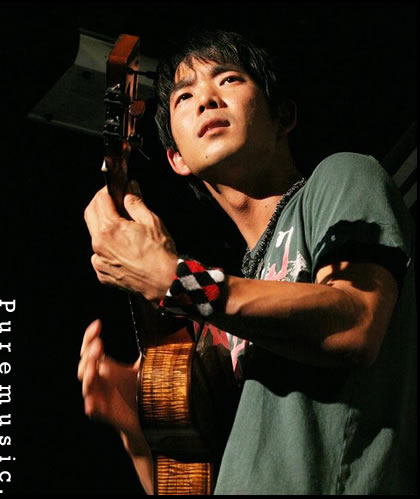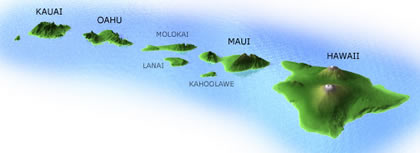
A Conversation with
Jake Shimabukuro (continued)
PM: Along those lines, Jake, give me an idea how big a deal the ukulele is--and I don't say it right, I hear you say OOkooLAYlay, right?
JS: Yes.
PM: How big is the ukulele as an instrument in Hawaii, where it originated? And what's the image of the instrument of the instrument there?
JS: Well, it's pretty huge here. I believe that on the Mainland in grade school, you learn the recorder, that's the first instrument you learn, right?
PM: Right, I think is still is, yeah. [I went to Catholic school--we sang...]
JS: In Hawaii, I think it's mandatory that all the students have to learn the ukulele. We all have like a one-month course in strumming basic chords on the uke. So everyone is familiar with that. And when I was growing up, everyone had one in their house. [laughs]
PM: Wow!
JS: Of course, it may have been collecting dust, but everyone had one.
PM: Amazing.
JS: And it's strange, because I mean when I first started playing I was doing a lot of traditional Hawaiian music, and I was also just trying to mimic other ukulele players that played before me. One of my all-time favorites is a man by the name of Eddie Kamae. He's noted as the first ukulele virtuoso, many decades ago. But he was really the one who stood out to me because he approached the instrument a little bit differently. He was still just a great traditional player, but then he also started playing other things that didn't sound so traditional to anyone. And he inspired a whole bunch of great players, people like Ohta-San, and Peter Moon and all these other great ukulele players that came after him. But Eddie Kamae is still alive. [He has become a maker of documentary films--read about that here.]
But because of him I realized that there's no limit to what the ukulele can do, and it's really just up to the player what you want to do with it. And then I realized it has all the same notes as any other instrument, any other westernized instrument, except it doesn't have the same range--except when you're playing a melody you can always bring it down an octave or raise it up on octave, whatever you need to do to make it work.
So that's what I did. I can play any song, there are things that make it work for my instrument. And that's what I did. I just opened up my mind to anything, anything that I heard on the radio or on a CD. I would just sit there and work through any song and make it sound authentic enough, and just... because of course you can play any song on the ukulele, but you don't want to make it sound easy, like you want it to sound--
PM: You want it to rock.
JS: [laughs] Yeah.
PM: --in whatever style you're in.
JS: You have to be true to--I guess, make it have at least the feeling of it.
PM: And I'm sure anybody can see that you're taking ukulele places that it not only has never been but might never have gone. [laughs]
And on top of just being a virtuoso guy, how amazing it is to be such a recognized ambassador between Japan and Hawaii at such a young age. What is that responsibility like, and how does that make you feel?
JS: Well, it was an honor, being approached to be an ambassador, to work with them and do that. I feel very good about it, because, first of all, I love Hawaii. I love our island. And just going around and I guess bragging to people about where I grew up and stuff like that, [laughs] it's just an honor to do that, I mean, because I think Hawaii really is a special place. And especially since I travel a lot now, I realize that there is no other place in the world like Hawaii. And I see a lot of killer places, and of course, I mean, every place has something wonderful and interesting to offer. But one of the cool things about Hawaii, aside from the weather and our multi-cultural lifestyle there, which is another great aspect, but there's also the people, their spirit and their attitude, what we call the "aloha spirit."
Right now I'm actually on the island of Molokai. I live in Honolulu, but I came out to Molokai because yesterday I did a few workshops for some of the high schools and the grammar schools here. So I came down just to do that. And my grandmother also lives here, so I decided to stay a few extra days and hang out with her. But when we're on this island, on the island of Molokai, time just stops. There's not a traffic light. There are no traffic lights here. No malls. There's only one little town where everyone goes and gets their groceries, where everyone on the Molokai gets their groceries. The population on this island is only 7,000.
PM: [laughs]
JS: And I mean, all there is to do here is go fishing or maybe do some hunting if you're into that. We have a lot of deer up here. Actually, tonight is a special benefit, we're eating deer tonight for dinner. I'm totally stoked. I can't even get cell phone reception up here. That's why I couldn't call you from my cell phone, I had to call you from my grandma's land line. But yeah, so it's great. I mean, every time the wind blows the cable goes out.
[laughter]
JS: But I mean, this is what I love. I love coming here, it's just great, especially after a long tour. Honolulu is kind of like a big city now, it's really developed into that. But it's still gorgeous. It's still beautiful, I still love it there. It's just different. Every island is different. I mean, that's the beauty of Hawaii; you come here and you can go to all six of the islands and just have a completely different experience.
PM: Wow. I can't wait to check that out someday.

Are you considering an album of duets with various string giants, is that in your future?
JS: I was just discussing that idea with a friend recently.
PM: You should do one with Kimock!
JS: Oh, my gosh, I would love to play with him!
[laughter]
[At this point Jake went very deep again into his somewhat unique appreciation of Kimock's style and groove.]
PM: Wow. You're such an enlightened and generous musician, you'll go right into talking about another guy in your interview, when anybody else would bring the conversation back to themselves. Your nature is really amazing to me. But I do hope you do that duets record. I agree with your friend, I think that's an important idea for you next.
JS: Oh, I would love to do it. Of course I would love to do an album like that, but I just wouldn't even know how to approach it. I mean, definitely Steve Kimock would be the first guy on my list. I would love to ask him.
PM: Well, one easy way to do it would be to pick the guys, or the women, and to say, "You pick the song and tell me what it is, and then let's talk about how to do it." And so then the repertoire is decided upon without you having to do it. They each bring a tune to the table, and then you don't have to think about that. But now in each person's direction I'll think about, okay, now, how do we approach this piece of music. But I really think that could be the next huge step for you getting to the next plateau.
Well, I've taken a lot of your time already, Jake. I'm very happy to speak to you today. And you've been very generous with your time.
JS: Well, thank you, Frank. What a small world, that you and Steve are the oldest of friends.
PM: Yeah. I talk to the most amazing people and sometimes his name will come up and they say, "Oh, him!"
[laughter]
PM: And I'm sure when he finally sees my email he may say, "Damn, you spoke to Jake? There are 21 things I wanted you to ask him!"
It's fantastic to meet you, Jake. And I look forward to meeting you in person, and hopefully seeing you play sometime soon.
JS: All right, Frank. Sounds great. Thank you very much. Hey, happy holidays to you. Merry Christmas and Happy New Year, and all that stuff.
![]()
|
listen to clips from the EP |
| print interview (pdf) | |
|
|
| jakeshimabukuro.com | |
| our review of My Life | |
| Jake's myspace | |
| photo thanks: | |
| Jayson Tanega | |
| Nobuyuki Ito | |
| puremusic home |
